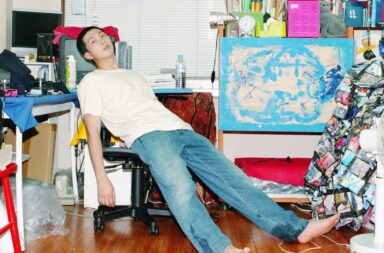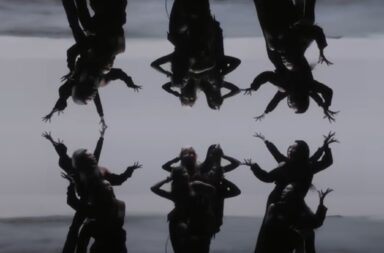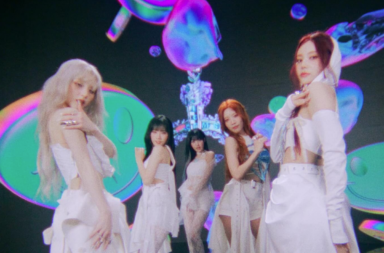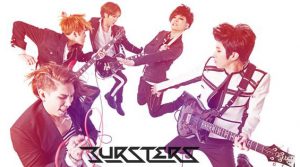 As the Hallyu Wave continues to spread across the world, it seems a goal for many Korean artists is to make a strong impression in the States and Europe. Though K-pop has been inundated with group acts and solo stars vying for the title of “first to crack the market,” their peers that fly more under the radar in their home country seem to be strategically making connections, as we’ve seen more bands have more tours in venues across the US. And while we all want to see these artists to get their due respect and recognition, what we fell in love with is their music.
As the Hallyu Wave continues to spread across the world, it seems a goal for many Korean artists is to make a strong impression in the States and Europe. Though K-pop has been inundated with group acts and solo stars vying for the title of “first to crack the market,” their peers that fly more under the radar in their home country seem to be strategically making connections, as we’ve seen more bands have more tours in venues across the US. And while we all want to see these artists to get their due respect and recognition, what we fell in love with is their music.
This year, we’ve decided to step outside of the Seoulbeats pool of writers and invite a couple of our friends from various indie sites to share their picks and impressions about this year so far in indie. Please welcome Jenna Rowe from Rock ‘N Seoul and Lore Walsh of BritROK as they join Cy for this detailed discussion.
| Cy | Jenna | Lore | |
| 1 | SLEEQ | National Pigeon Unity | PATiENTS |
| 2 | Dumbfoundead | The Hans | Corona |
| 3 | Hippy was Gipsy | Bursters | The Black Skirts |
| 4 | WAVISABIROOM | Yeseo | The Vane |
Cy: There were so many amazing indie releases this year! As our lists prove, the first half of 2017 was just a wealth of artists across all genres releasing music that, in my mind, easily upstaged anything coming from mainstream K-pop and major record labels. So I suppose my first question is, how do you all define “K-indie”? And with that definition, how do you define “good K-indie”?
For me, if we’re taking it from a literal understanding of the word “indie,” it’s simply music not funded or supported by a major label or huge backing. Something that’s done mostly if not completely at the discretion of the artist, or at the very least at a label that gives their artists the room to do whatever they please. In that same vein, indie is music that’s not defined by industry standards, if you will. As such it can cover any and every genre, any and every stylistic choice an artist makes. Tl; dr: K-indie is anything goes.
With that in mind, “good” indie to me is anything that manages to excite. It’s music from artists that take full advantage of that idea that they’re a slave to no one creatively. Though I did have to go back and change my list a few times, even those artists brought something to the table that completely rearranged and reworked my perspective on what kind of music artists in South Korea are willing to, if not absolutely dying to create! A lot of what’s coming out in R&B and hip-hop this year is hit or miss and one-note, not gonna lie. But that’s what happens when there’s a huge surge in popularity of anything: everybody wants in on it because that’s where the money and attention is.
Well, with these artists, none of that is the main factor in why they create. Yeah, everybody wants cash, and anyone who says otherwise is trying to play up an innocence that doesn’t exist in the music industry. But what these artists have done, in my humble opinion anyway, is challenge the look and feel of the genres they’re in. They’re completely taking the root purpose of the genres from their initial inception (pure expression wrought from personal experience, demons, joys, etc.) and morphing them into something that’s really surprising.
Lore: Indie forms a much larger sub section of the Korean music scene than it does in most other countries. With the mainstream being almost wholly saturated with pop artists, more so than any other country, almost anyone else could drop into the “indie” label.
Though, it is almost a global feeling that an indie musician is one that is independent in the whole sense. There is a lean towards those that play their own instruments in the stereotypical thinking surrounding “indie” (and admittedly those are the ones my site focuses on more), but Korea especially displays the full spectrum on independent artists, from the ordinary to the obscure, from tradition to the height of modernity.
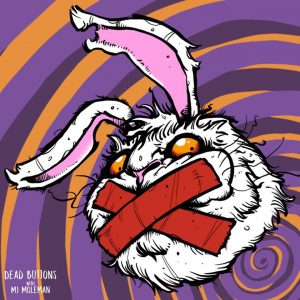 As for “good” K-indie, this differs in no way to “good”‘ indie. For me the “K” denotation is far more irrelevant when associated with independent music than it is with K-Pop. K-pop has become its own unique entity — for pop music isn’t K-Pop without the huge economic and sociological machine that runs it in the somewhat unethical and peculiar way it has developed. K-indie is simply indie artists playing predominately in Korea, there is no need to be Korean (see Genius, Whatever That Means…, etc.), or sing in Korean (see Dead Buttons, LayBricks, etc).
As for “good” K-indie, this differs in no way to “good”‘ indie. For me the “K” denotation is far more irrelevant when associated with independent music than it is with K-Pop. K-pop has become its own unique entity — for pop music isn’t K-Pop without the huge economic and sociological machine that runs it in the somewhat unethical and peculiar way it has developed. K-indie is simply indie artists playing predominately in Korea, there is no need to be Korean (see Genius, Whatever That Means…, etc.), or sing in Korean (see Dead Buttons, LayBricks, etc).
“Good” indie is very subjective, and no matter how open-minded one might be the answer to this question is always going to be different. Though indicators of a technically good indie artists are the precision of craft, their creativity, their ability to stand out from the crowd even at their simplest.
Indie, at least in terms of the focus BritROK takes, can be extremely derivative. A good indie artist is not one that can give a perfect rendition of an Oasis classic, complete with drunken slurring and additional curse words for that Gallagher authenticity. A good indie artist is one that can take that Oasis classic and present it with a freshness that makes you think, infuse their own vitality, and leave all thoughts of Gallagher brothers behind.
The Gallagher brothers also represent another of the indie band stereotypes — the artists who need not have extensive knowledge of their instruments or impressive vocal skill to gain traction. These things exist in indie the world over, they exist in the mainstream the world over too. There is plenty of mediocre talent in the South Korean indie scene, whatever the influencing genre, and though this can be hugely subjective it is hard to deny when the frontperson of an act cannot sing, or when all their songs sound the same because the guitarist can only play minimal guitar.
My list could contain many “good” indie artists, but I determinedly chose artists that show a skill for their craft and an ability to take their influencing genres and make something that resonates with their audience. Even when admittedly including one of my favourite artists my reasoning is based on their immense growth and that they have made one of the most impressive tracks in their careers, feeding from new influences that may at first seem too far from their underlying genre label.
Jenna: I think Cy and Lore have both hit the nail on the head as far as indie music goes, especially in Korea. Korea is a strange market, where the majority of the population listens to ballads, OST tracks, and trot, with the youth making up the market for K-Pop. Outside of those few genres, everything else goes for indie. I think Korea has made massive progress over the last 15 years as far as musical growth and market expansion, but I know that most of the artists I love and support are still struggling. Most of the time I think of indie as an artist that hasn’t been signed to a label, doesn’t play on TV (variety shows, weekly competition shows, etc.), gets very little radio (not streaming, but actual radio) play, and don’t play large stadium-sized solo shows.
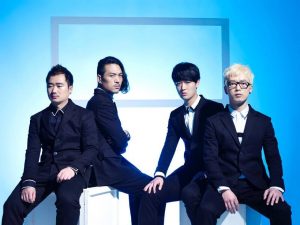 My best example of a band that started as indie, but I now consider mainstream in Korea is Guckkasten. They just played a major stadium show. They’re on all the variety and vocal competition shows, and pretty much everyone in Korea knows their name for one reason or another. Will I still write about them for Rock ‘N Seoul? Probably, because our goal is to spread the word for non-pop acts around the world. But in comparison to The Hans, who I chose just off the release of their second EP, Guckkasten needs less promotion. The Hans have a little less polish on their routine and more to learn and grow than Guckkasten.
My best example of a band that started as indie, but I now consider mainstream in Korea is Guckkasten. They just played a major stadium show. They’re on all the variety and vocal competition shows, and pretty much everyone in Korea knows their name for one reason or another. Will I still write about them for Rock ‘N Seoul? Probably, because our goal is to spread the word for non-pop acts around the world. But in comparison to The Hans, who I chose just off the release of their second EP, Guckkasten needs less promotion. The Hans have a little less polish on their routine and more to learn and grow than Guckkasten.
Now what makes good indie music? For me, I think it comes down to a combination of raw talent, technical mastery, and passion. If you have the right combination of all those components, it’s going to attract my attention. And I don’t think they need to be in equal measure either. Sometimes I will put up with someone that has simpler composition but amazing vocals and fantastic lyrics. Or I’ll enjoy a band for their pure energy and ignore the fact that I can hear issues in their recording equipment, because they recorded it in a garage or a basement. It’s a delicate process, but I find myself attracted to artists that push limits of what is normal or “accepted” in Korea.
I picked Yeseo because she was an out-of-the-box find for me. I think I stumbled on her after letting a YouTube video pass on to a new track and was instantly pulled in. It’s opened me up to a new genre (chillwave) that I’ve been having a lot of fun exploring. Her version of this genre is a splendid mix of jazz, ambient electronic music, and clean R&B-style vocals. I think for someone that tends to gravitate towards the gravely grunge side of Korean music, this one was a bit out of left field for me, but I find myself constantly checking her Soundcloud account for new tracks. She is also part of an effort of mine to explore more female vocalists, as I tend to pigeonhole myself into listening to too many male bands.
[soundcloud url=”https://api.soundcloud.com/tracks/309616520″ params=”color=ff5500&auto_play=false&hide_related=false&show_comments=true&show_user=true&show_reposts=false” width=”100%” height=”166″ iframe=”true”/]The Hans hit me out of nowhere with this latest EP. I think I had heard of them before, but I hadn’t explored them really before this latest release. Last year they were contestants on Hello Rookie, and I think that helped them really grow and expand their sound. They worked with veterans Love X Stereo for the recording of this album, and I think that helped them polish what they were already working on perfecting sound wise. I can’t think of anyone else doing anything quite like them right now. They fuse pop-rock with blues and make it a fun upbeat journey into their own little world.
Bursters were on my radar already from their release last year with “Lost Child.” Their alt-rock metalcore sound reminds me of the Korean rock I first got into 10 years ago or so. I think that it’s a genre I will always love, even if it tends to be more mainstream. Vocalist Dae-gun has a great rasp to his voice that lends itself to powerful metal screaming but also beautiful ballad-style singing on their softer songs like “Wherever You Are.” This reminds me of bands like Seo Taiji and the Boys, Nell, and even old-school Dr. Core 911. I think they have massive versatility, and they’re risking styling themselves more like idols in most of their promotions, I believe in order to suit the more mainstream fans. I am okay with this because I would love for rock to become more mainstream in Korea. These bands deserve it, and I want Koreans to start looking past the trot and K-pop into their massive wealth of talent.
Last year I was lucky enough to catch National Pigeon Unity live. For a two-piece band, they sure make a lot of noise, and I was instantly enamored with them. I had already been a fan of theirs for awhile, but there is something magical about seeing any band live that can make my like/love of them so much more intense. This is the bands’ tenth anniversary together, and they’re pushing themselves harder than ever.
NPU definitely tick all my favorite boxes for a band: passion, creativity, they’re unique, and they play LOUD, RAW music. What has always drawn me most to Korean music is the newness of it. Of course rock music has been done for ages, but Korea had to skip a few years of growth because of backwards laws. They missed the Beatles era and the late-’70s/early ’80s punk movement. They watched Grunge happen but weren’t actively participating in it. I think bands like NPU are the result of the music scene catching up to the rest of the music world. They’re exploring those raw emotions and sharing them with us. They express the anxiety and pain that Korean youth are dealing with. I love watching their progress.
Let me hear what you guys love about the artists you picked! And what have they done this year to make an impression on you?
Cy: To answer Jenna’s question, if the amount of times I actually changed my list in the thread is any indication, it’s clear I was having one hell of a time deciding who to choose. The only person that was unwavering on my list was SLEEQ, and her position was staunchly at #1. The main reason being she’s one of those rappers that’s flying heavily under the radar. To the point that she’s become an “underground legend,” if you will. You can feel every grit of teeth, every growl in her verse and her delivery. Not only that, I have a soft spot for anyone who claims loud and proud to be a feminist and in the same breath daring anybody to try to challenge her because of it. She’s so passionate about who she is and what she does, and that passion comes through like nothing else in her music. Never mind the fact she could ether almost any rapper, male or female, coming out of South Korea right now. YEAH, I SAID IT! FIGHT ME!
[soundcloud url=”https://api.soundcloud.com/tracks/309622710″ params=”color=ff5500&auto_play=false&hide_related=false&show_comments=true&show_user=true&show_reposts=false” width=”100%” height=”166″ iframe=”true” /]I added Dummy and Hippy Was Gipsy on the merits of the albums they released this year. Dumbfoundead’s album was… *sigh* Okay so if there was anyone who was going to challenge SLEEQ for the top spot it was Dummy — one of my favorite battle rappers off all time. His EP pretty much just attacked me from the first note of “Hyung” to the last note of “Send Me To War.” Never mind the fact that his flow, his attention to detail, his aggression, and his ability to weave personal stories in every verse is completely stunning, this man just dropped five tracks that could rival any piece of music coming out of SK… again, FIGHT ME!
Hippy Was Gipsy came to me completely by surprise via vocalist SOMA, who was on my list at one point. Everybody and their mama is doing some form of wavy, R&B-infused lo-fi nowadays, but this was the first one that I grasped on to with all my might because of just how crisp it was. This piece of music made me melt. Initially I had Bevy Maco in his spot, but even the sleek sexiness of Bevy didn’t slap me in the face with as much authority as Hippy.
Then there’s WAVISABIROOM. Point-blank, anything Jjang-you does is going on some list of mine during the year. From his early days with DJ DOL in ILLAP, to his latest project with J-Flow and arwwae, he’s always managed to find a way into my heart. However, the styling between both groups is so different. There’s so much ’90s hip-hop in the sound now it’s ridiculous. I likened them to Lords of the Underground and A Tribe Called Quest in their sound: almost lazy flow with a wavy jazz foundation. There was no way I was going to not have them on my list. And though they ultimately ended up lower than I’d originally intended, just how profound an impact their latest album Vibe had on me ensured they were going to end up on this list without a shadow of a doubt.
Lore: I chose PATiENTS because I am biased, first and foremost — but mostly because they released “Space Call Girl” this year. They actually debuted this track on their UK tour last year, but it has developed in the time between demos and official release. “Space Call Girl” captures all their punk undertones but explores this with so much skill. Keyboardist, Kwon Hyuk-jang, really displays his talent in this track, proving that he is possibly the most pivotal part of the group, as it is his keys that mean “Space Call Girl” journeys into dreamscapes reminiscent of Bowie‘s finest works. If something gives me Bowie chills, I’m going to sing its praises forever!
I chose Corona, The Black Skirts, and The Vane for very basic “they made me pay attention” reasons. I was mostly aware of The Black Skirts because of Verbal Jint‘s “You Look Good” before the past year. Being a big Tablo fan I of course paid attention when they joined his label. It is arguable that their influence in 2017 is largely down to being a part of that label and the power in Tablo’s name, but their work is still an incredibly valid contribution to indie arts and well worth a mention, at least if just to debate if the power of the Epik High rapper put them in the hazy section of indie that isn’t quite independent anymore but still isn’t out in the mainstream.
Corona for me simply stood out because of the nice shoegazer Britpop style of my childhood that they take me back to. The Vane never fails to impress me because of his voice. “Round & Round” had something very Kings of Leon about it in it’s backing, though it never feels derivative of KoL because the vocal sections don’t draw that same reference — in itself interesting. As a graphic designer it was also nice to see such a stand out artistic MV accompanying the song.
Jenna: Cy, I honestly haven’t heard of any of yours except Dummy… LOL. But I sort of linger on the outskirts of K-hip-hop/R&B scene.
I like SLEEQ’s flow. Her gravely voice and genuine talent are so far above what passes for “rappers” in the Korean mainstream, I hope she can crawl out of the depths of the underground scene to get her share of the spotlight. Hippy was Gipsy was a unique artist. It’s almost along the same lines as the chillwave movement I’ve fallen into lately, just even slower — almost like everything has been slowed down to quarter time.
I have to admit to not having got my hands on the Black Skirts’ new album yet this year, but I’ve listened to them for years, so it’s on my radar. I can’t wait to hear it. Corona is new to me also, so I had to give them a listen. Nice, soft melodic stuff. I could see it being good calm-down music. I’ll have to add them to my acts to watch list. I have spread the word about the Vane this year already, so that’s a solid choice. Those vocals hit me out of nowhere. I see them becoming the next Nell, if anything.
And I always love Patients. I think that Lore and I are both a little biased when it comes to them, especially after seeing them perform at Zandari last year. I remember when they added the keyboards to the band as an experiment, and I ended up loving the new sounds they were making. I think they grow and grow every year. I don’t understand why they haven’t been able to get a toe-hold here in the States. I know they’ve been applying to fests left and right, but the UK is the only one giving them love.
Cy: Jenna brings up an interesting point: notoriety and reach. We, of course, want the artists we love to make a name for themselves within as well as outside of South Korea. Which of the acts on your lists do you think has that type of “crossover” appeal (I hate using that word, honestly, because it infers that something has to change in order to translate to a non-Korean audience, but I digress) to reach outside of South Korea?
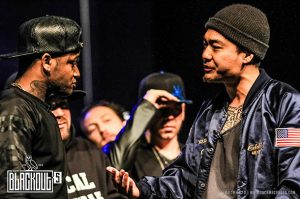 If I’m being honest, I kinda cheated by adding Dummy here… Haha. Yes, he is of Korean descent, and yes he recorded this album in Korea with Korean features. But he’s established himself from his days on King of the Dot. Honestly, the R&B and hip-hop scenes in the US are very… insular. There’s a great deal of skepticism when those considered “outsiders” decide to come through, particularly if they’re Asian. They essentially have to prove they belong by being something completely out of the box that still manages to adhere to and respect the roots of the genre. This is the reason someone like Dean has done so well in the States and has worked with so many artist and producers here.
If I’m being honest, I kinda cheated by adding Dummy here… Haha. Yes, he is of Korean descent, and yes he recorded this album in Korea with Korean features. But he’s established himself from his days on King of the Dot. Honestly, the R&B and hip-hop scenes in the US are very… insular. There’s a great deal of skepticism when those considered “outsiders” decide to come through, particularly if they’re Asian. They essentially have to prove they belong by being something completely out of the box that still manages to adhere to and respect the roots of the genre. This is the reason someone like Dean has done so well in the States and has worked with so many artist and producers here.
If our artists really do want to try to split their focus between a Western audience and their home audience, they all may have a chance because they’re so outside the borders of their respective genres they could turn some heads. Of course language is a barrier, but ultimately what fans and connoisseurs of hip-hop and R&B care about is the music. There are the few but loud who gobble up anything that’s more a novelty act; however, for the most part if you bring some honest-to-goodness music to the scene, something that could just freak people out because they a) weren’t expecting it, or b) have never heard it before, you’ll have an audience, and one that will respect you. I think if WAVISABIROOM really wanted to give it a shot, they’d get a lot of respect from old-school hip-hop heads. SLEEQ could honestly trash a lot of rappers in the States now. But again, in both cases it’s the language barrier.
Is getting notoriety outside of Asia something you guys think artists should even think about?
Jenna: I think the best strategy for artists to stand out in their home markets and internationally is to stay authentic. If it’s their thing to write and sing in English, great. If they mix it up and go bilingual? Even better. But if a band changes just to attract the attention of a different market, people notice. The music and lyrics lose their integrity. I’ve seen so many musicians completely change their lyrics, their music style, and even the way they sing, all in the name of “fitting in” It’s failed every. single. time. Look at early K-Pop pioneers BoA and Se7en. They changed their image. Se7en went from being a pop idol to some weird wangster wannabe. BoA’s team thought it was good to make a cheesy ’90s-style music video for “Eat You Up” but then put out a kick-ass Korean version that blew it out of the water.
I even saw YB change for the management company they were working for here. They remade “Cigarette Girl” for a “Western audience,” and it didn’t go anywhere. It’s not because the song was bad, but their changes were SO forced. Do-hyun was forced to play this sexy flirt of a guy chasing a much younger model girl, while the rest of the band was featured in the background. In a conversation I had with them, they admitted that it took him like 24 hours of recording and practicing just to record the lyrics. JUST THE LYRICS. It’s not because Do-hyun doesn’t have a good grasp of English, because he does, I’ve had conversations with him. It’s because they forced him to rewrite a song that he already had a good handle on in English to fit whatever box they wanted him to fit into. When artists compromise their integrity, even casual observers can sense it. And they’re not interested.
This leads me to artists that you mentioned, Cy. Dummy and Dean are making things happen because they bend with the changes instead of forcing them. Dean has changed himself very little to fit the American mold. He just does what he does and people are taking notice. He works with musicians here and just fuses what he does naturally with their style. It’s not forced, he doesn’t feel the need to write lyrics in English that don’t suit him, and it works. Dummy is the same, he’s been performing for how long, and he just now made a Korean “debut”? He did it when it seemed natural. He’s been so big here in the battle rap scene, and then making a really good niche for himself online and doing campus shows, building an audience, that people in Korea couldn’t help but notice what this big Korean-American rapper was doing. So he did some collaborations, he built relationships with artists in Korea, and then, when the time felt right, he up and tossed “Hyung” at us, and it stuck.
I see these both as good examples of what artists should do. Don’t come over here, toss songs at us with featuring artists or producers that have big flash-in-the-pan type appeal and expect us to like it. You could just be another Nicki Minaj wannabe — and we have plenty of our own here, thankyouverymuch. Bring us authenticity, bring us your soul, your empathy, your passion. We’ll take that, in any language, any day.
Cy: My opinion on “breaking into the States/West,” as it were, kind of is at odds with what it seems to be the desired endgame for most artists coming out of Korea. While I think ultimately I want all the artists I love to take a foothold in the Western music industry, I don’t think it should be the end-all be-all of what they do. Especially if they think they need to change who they are musically to attain it. I mainly want them to break into the industry because there’s a promise or at least hope that they’ll be able to perform here more often. Thus for totally selfish reasons I wouldn’t mind seeing more artists gain recognition here — I want to see them perform live, and I don’t have the cash to do it in Korea.
But, yes, Jenna, as you said. Dummy sort of had a different upbringing, being actually from the States — though making ground in Korea, which it seems he’s been trying to do for the past few years — is a breakthrough for him artistically. I think in order for the other acts I chose to make some noise, it would require a bit more work on the audience’s end than the artist… at least in terms of musical vision. You’d hope that listeners would be more open to sounds that are both figuratively and literally foreign to them. One can only hope. I’m desperate to see SLEEQ and WAVISBIROOM perform. I’m waiting to see more from Hippy in the future, but I don’t think I’d have a problem loosing some coins for his cause.
Any last thoughts about the music coming out of Korea’s indie scene the first half of 2017?
Jenna: I think that as I have watched the Korean “indie” or non-K-Pop scene grow and grow over the last 10 years or so, it’s safe to say that the quality, quantity, and variety of music coming out of Korea has exploded in the last four years or so. I’m sure that the onslaught of new K-Pop fans have helped that. I have to toss a quick nod to KOCCA and the DFSB Kollective for really pushing hard to get funding for indie artists. It may seem like it’s a small effort compared to the stadium shows that artists like BTS and Big Bang are pulling off, but for all these tiny bands that barely get airplay back home to be playing SXSW, Canadian Music Week, and festivals like Focus Wales in the UK, it’s a big deal.
I think so far this year I’ve seen more Korean bands on tour out here in the West than I ever have. So I feel like there is movement, the bands are getting noticed and picked up by labels outside of Korea. I think 2017 has been an exciting time for Korean music, a K-Pop act won a Billboard award, sure, but at least two dozen Korean indie artists have hit the road and toured the world. And for each and every one of these bands, it was a life-altering moment for them. I just hope we, as journalists and lovers of Korean music, can help the artists to keep up the pace.
Lore: As always it is nice to see indie artists still emerging and not being disheartened by the pop saturation. Also very interesting to see the emergence of overseas promotion patterns. Hip-hop in the US, instrument-playing bands in the UK.
Cy: My final thought is this: I hope these artist never stop. Like Lore, I’m ecstatic that so many artists are taking risks, not being intimidated by the ever-increasing popularity of their peers in K-pop. From what I’ve heard from many of the indie artists, their mindset is what helps K-pop helps all Korean artists. I think just how often we see them testing the waters in the States is testament to that. I’m looking forward to seeing our artists as well as many others stake their claim as the year goes on.
What are some of your favorite indie artists thus far in 2017? Again, a big thank you to Jenna and Lore for their insights. Remember to visit their sites for more in Korean indie music!
(Images via Facebook [1][2][3], Vancouver Weekly, Soundcloud [1][2], YouTube [1][2][3][4][5][6], BattleRap.com.)
